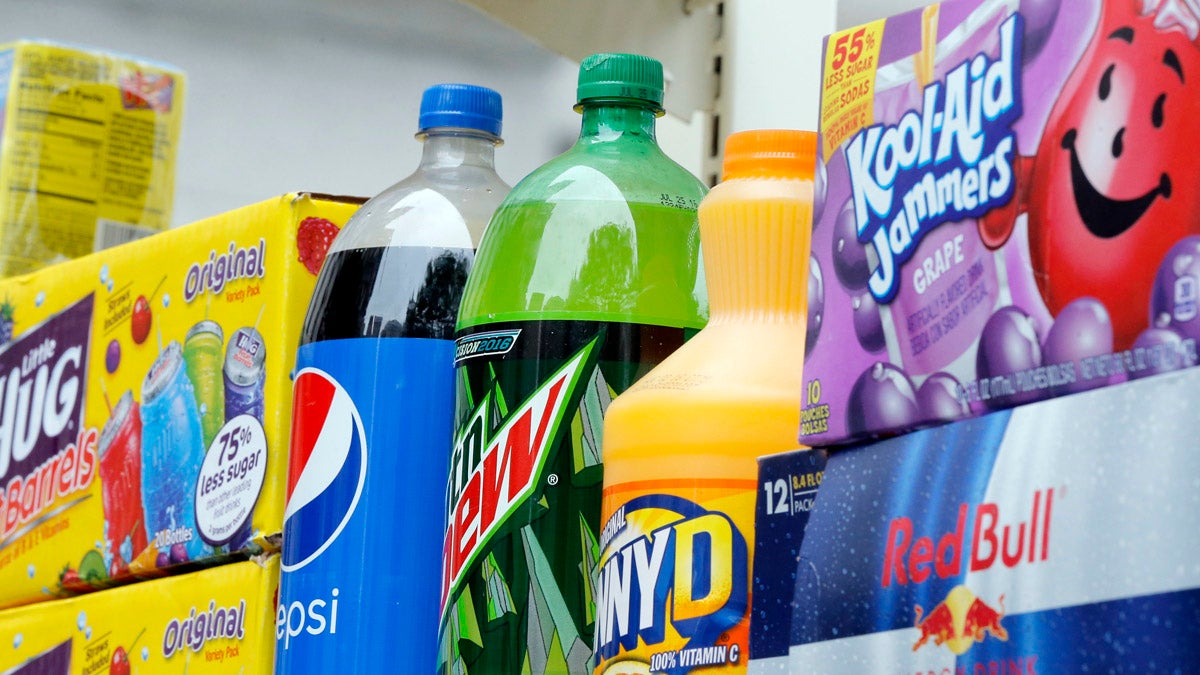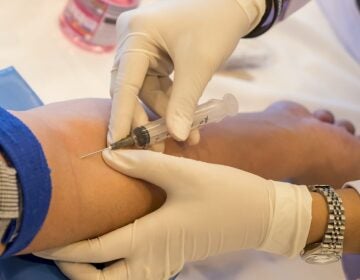Soda industry challenges Philly sweetened beverage tax in court

The fight against Philadelphia's sweetened drink tax is moving into the courts. (Emma Lee/WHYY, file)
Groups including the American Beverage Association are trying to knock down Philadelphia Mayor Jim Kenney’s sweetened drinks tax in court before it is supposed to take effect in January.
The association and other plaintiffs have filed a lawsuit in state court alleging the 1.5-cents-per-once levy on regular and diet soda and other sweetened drinks is unconstitutional and should be immediately blocked.
In June, City Council passed Kenney’s tax on sweet drinks, one of the mayor’s cornerstone policies intended to generate revenue to pay for expanded pre-kindergarten for children around the city and improvements to parks and recreation centers.
For a 12 ounce can of soda, the tax would be 18 cents. For a 2-liter bottle of soda the tax would be about $1.
Millions were spent on campaigns for and against the tax. Supporters dished out around $2.5 million, whereas anti-tax forces, including the American Beverage Association and Cola-Cola, unleashed $10.6 million in an attempt to defeat Kenney’s plan.
The lawsuit, which has been expected for months, sets the stage for what will likely be a months-long court saga as city attorneys face off with the beverage association over whether the controversial tax is on firm legal footing.
The suit has three primary arguments. First, that the soda tax is duplicative since Pennsylvania already taxes sweetened drinks as part of the sales tax. Secondly, that the proposal is not applied consistently since it’s a volume-based levy, not assessed by cost, violating what’s known as the state’s uniformity clause. And finally that the tax breaks state and federal laws about SNAP benefits, formerly known as food stamps, which are used to buy grocery items, including soda, tax-free. The filing argues this tax would put the federal government in the position of subsidizing expanded pre-K and the other initiatives the new tax is tended to support.
City officials have predicted that the tax will bring up around $91 million of new revenue each year.
“About $23 million of this $91 million revenue raise will come right from the federal treasury, and that’s a no-no,” said Shanin Specter, who is representing the American Beverage Association in the lawsuit, which was filed on Wednesday in the Philadelphia Court of Common Pleas.
Other plaintiffs in the suit aimed at halting the soda tax include the Pennsylvania Beverage Association, the Pennsylvania Food Merchants Association, wholesale distributor Metro Beverage of Philadelphia and the popular South Philly sandwich destination John’s Roast Pork.
Throughout the debate about the tax proposal, Kenney administration officials have maintained that since it targets distributors, not consumers at the point of sale, it is not technically a sales tax. Furthermore, the fact that the levy is based on volume, not price, with no intent that the tax be borne by consumers mean that it’s not technically a sales tax.
Yet opponents have said that market forces would pass on a large chunk of the tax to consumers, regardless of where it is levied. In Berkeley, Calif., which also has a soda tax, researchers have found that consumers paid about 70 percent of a 1-cent-per-once tax.
Specter said he’s not too worried about the city’s argument.
“We don’t have to prove it’s a sales tax in order to win,” Specter. “We are not going to get caught up on that distinction.”
The beverage association has, from the beginning, been saying that Kenney’s initiative is regressive, saddling the poorest Philadelphians the most, and that’s a point that underlined throughout Specter’s 61-page lawsuit.
“The tax will meaningfully diminish the everyday purchasing power of Philadelphia residents,” the suit says.
Specter said that Philadelphia officials tried to impose a liquor tax in the 1960s, which was struck down. And there was a financial investment levy introduced in the 1940s that was also stricken. He expects the soda tax to follow this trend.
“The state has said forever that where they tax, in a certain area, the city may not tax there, unless the state separately authorized it,” Specter.
In a statement, City Solicitor Sozi Tulante said that he’s confident the tax is a proper exercise of the city’s authority, saying the courts will uphold it.
The city has retained private counsel, including former City Solicitor Ken Trujillo, to assist in with the legal defense.
Kenney said the tax on sweetened drinks has always been about improving parks, recreation centers and libraries and giving the city’s children an educational boost.
“While it is repugnant that the multi-billion-dollar soda industry would try to take away these educational and community programs from the hundreds of thousands of Philadelphians who need them, we were not surprised by their lawsuit given the ten million dollars they have already spent opposing the tax,” Kenney wrote. “I have no doubt we’ll be successful in defeating the lawsuit.”
The Philadelphians Against the Grocery Tax Coalition, which includes many corner stores, beer distributors and convenience stores, put out a statement claiming that the tax will hurt low-income families and family-owned businesses.
“Restaurants and corner stores located on the Philadelphia border are also concerned they will lose customers to less-expensive options in the suburbs,” the coalition’s Larry Miller said.
DV.load(“https://www.documentcloud.org/documents/3107416-Complaint.js”, {
width: 600,
height: 600,
sidebar: false,
text: false,
container: “#DV-viewer-3107416-Complaint”
});
WHYY is your source for fact-based, in-depth journalism and information. As a nonprofit organization, we rely on financial support from readers like you. Please give today.




